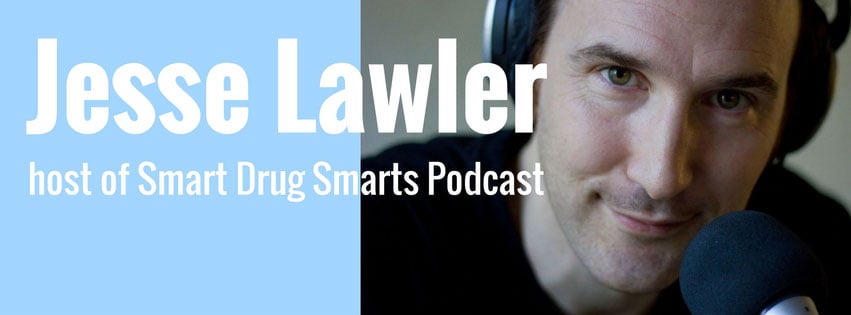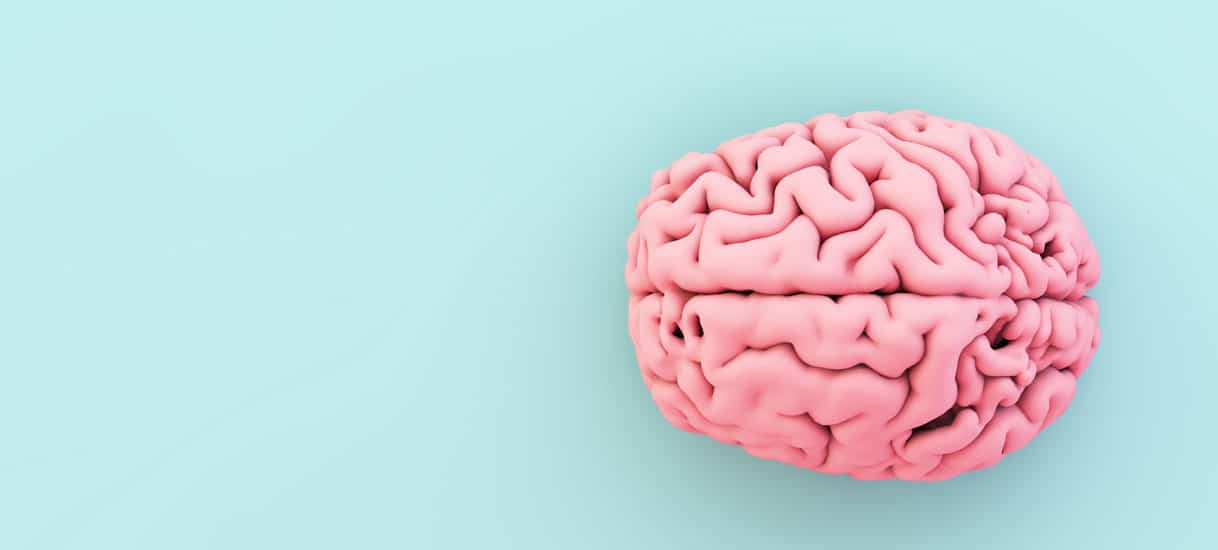
I’m really excited for this Expert Interview with brain-hacking extraordinaire Jesse Lawler, host of the Smart Drug Smarts Podcast. Smart Drug Smarts is easily one of the most popular podcasts for the actionable applications of neuroscience. Jesse interviews top Ph.D. neuroscientists and medical professionals to help us all in our pursuit of having more brain power to get stuff done and do the things we love.
In his effort to improve cognitive function, Jesse takes self-experimentation to the next level. He is known for his extreme dieting (fruitarian, raw vegan, fasting, paleo, etc.) and pushing his body to the limits. He recently told me that he will be blindfolding himself for 7-10 days to see if he can temporarily give himself super-hearing*.
*Recent research suggests that the deaf and blind experience not just an improvement in their remaining senses, but an actual rewiring of the brain that boosts these senses.
After four years of interviewing experts, Jesse is uniquely qualified and has valuable insights into brain function. (And, I am really curious to know what crazy self-experiment he’s up to now.)
Take it away Jesse…
..
[Dr. Alexis] How did your healthy obsession with brain optimization come about and who can most benefit from the SDS podcast?
[Jesse] I was a software developer who learned to his surprise that cognitive enhancing compounds “are a thing” and got more and more fascinated by the idea. The funny thing is, back then — this was ten years ago now — I wasn’t even a regular coffee drinker. Which is maybe why realizing that beneficial compounds were out there was a bit of a revelation for me. As one who wrote code for a living, finding that there was something that could help me sit with laser-focus on my laptop for hours at a time without passing interest in goofing off, or going to the bathroom… That was appealing. Although, describing it that way, it makes this state of ultra-focus sound pretty physically unhealthy.
And that’s a point I try to hit a lot: I view our brain as not having an ideal state, and I squirm at the question “what is the best nootropic?” The answer is: “It all depends on what you’re going for…” And to keep ourselves physically, mentally, and socially healthy, we have rhythms and cycles we need to pass through. Wake, rest, sleep. High and low arousal. Hungry and satiated. And so on and so on. I even think it’s worth being in a rotten mood every now and then just to accurately appreciate how good a good mood feels.
The Smart Drug Smarts audience is made up of people who are fascinated with their brains and want to hear direct from scientists about how to best use, optimize, and preserve them. Probably 75% of our guests are Ph.D. neuroscientists, and most of them work in academia and have no particular financial interest in the technologies we talk about on the show.
[Dr. Alexis] What is your short philosophy on optimal brain health?
[Jesse] Respect the evil power of bad habits that undermine your brain a little at a time.
Push yourself to “think hard” daily about something unfamiliar.
Pay attention to your cognition just as much as you do your weight, your bank account, and your love life.
[Dr. Alexis] What do you consider to be the craziest or most interesting self-experiment that you have ever done?
[Jesse] Oooh, tough call. Honestly the most interesting self-experiment would probably be one where I crashed and burned — trying to do the Uberman Sleep Schedule. In retrospect, this was a stupid thing to try, and I don’t really think the people who claim good results from it are honest or sane or human. However, it was worthwhile watching my consciousness sputter under extreme sleep deprivation. I learned a thing or two about willpower, and gained an appreciation of just how much sunlight affects cognition. (There’s a huge difference between being exhausted at 4:30am when it’s dark out, and being exhausted at 6:30am with the sun up.) Again, I’d draw a huge line here between being “interesting” and being “something I’d recommend.” Being in prison, for example, would qualify as “interesting” — but I’m not putting that on my bucket list.
I feel obligated to add a runner-up to this question… Riding my bicycle coast to coast without having trained for it. Excellent learning-by-doing and has impacted my personal rules for goal-setting and accountability ever since.
[Dr. Alexis] What is one health myth that you wish would just die?
[Jesse] “We only use 10% of our brain.” This is so obviously false if anyone takes more than 1% of their brain to think about it. The analogy I like to draw is saying “We only use 10% of our muscles,” because at any given time, we might not be simultaneously doing burpees and flexing our jaw and rolling our eyes back in our head. The point is to have our brain on call when we need it, not to have every neuron in action all at once, all the time.
And the opposite idea, that 90% is just a sitting slab of tissue that never gets used is equally preposterous. Countless mothers have died in childbirth trying to fit our obnoxiously big heads out their birth canal. We wouldn’t have these deadly-sized heads if all that brain tissue were sitting idle.
[Dr. Alexis] What is your favorite brain hack to date – when you need fast focus, motivation, and an increase in productivity?
[Jesse] I differentiate pretty sharply between Focus and Creativity — but if I know what I need to accomplish and I’m looking more for speed and focus of grinding something out, my ritual is as follows:
1 – Solid night’s sleep.
2 – Get up, get on bicycle, hard ride at speeds meeting or exceeding standard traffic for 10-20 minutes. (Wear a helmet!)
2a – Led Zeppelin II on wireless earphones, adjust volume to taste
3 – Arrive at café. Remove helmet. Head for the bathroom. Poop. (Optionally, you can poop while wearing the helmet, but that seems overly pessimistic.)
4 – Order a large “Americano” coffee, black.
5 – Switch the earbuds for noise-cancelling headphones and adjust music to something that still has a driving tempo, but without English lyrics.
6 – When coffee arrives, add 3 grams of fish oil (capsules).
You could do this any time of day, but I take some oils now because it helps the next ingredient absorb better…
35 milligrams of Armodafinil (1/4th of 150mg pill)
1/2 of smoking-cessation nicotine patch, applied on right shoulder
I’ve tried a full patch, but it’s a little too strong for me, as a never-touched-a-cigarette nicotine wimp. 1/2 feels like my Goldilocks Zone.
7 – Get down to work. Do not expect to come up for air (nor want to) for quite some time.
(Note: Although the nicotine patch and Armodafinil is all the rage with brain hackers, I am still not convinced of the long-term safety. I recommend taking these drugs only based on medical necessity. If you would like a substitute – experiment with taking ashwagandha and phosphatidylserine for improved focus, motivation, and memory.
[Dr. Alexis] Any specific foods or food habits that you feel have a noticeable impact on how your brain works on a daily basis?
[Jesse] I’m a giant fan of Intermittent Fasting (IF). Apparently it’s good for a lot of stuff — weight loss and BMI maintenance high among them — but I’ve stuck with it because it a) saves me time and b) regardless of how healthy I eat, I always seem to be a bit more mentally alert with an empty belly. Probably 5-6 days per week I’ll go sans calories until 4pm, then have a “feeding window” of about 7 hours until 11pm. I’m not super strict on the exact start/stop time — which is another nice thing about IF. You don’t have to be. If I want to start eating early on some day, I just slide my “window” earlier and don’t have an 11pm dessert (or whatever).
[Dr. Alexis] Any research that you have come across on brain health and neuroscience that you feel like needs to make it to the mainstream?
[Jesse] There was a guy identified in France in the last couple of years who has way less than half a brain. Based on a screwed-up medical procedure he had as a child, his skull was slowly filling up with fluid, further and further reducing the available space for his brain. The thing is, while he’s not the smartest guy in the world, he’s basically just fine. The brain “damage” was very slow, and his fluid-filled head was identified by doctors almost on a fluke. It’s an amazing example of just how flexible our neural hardware is, and how “Oh, I could never do that” is just a bogus, self-sabotaging belief. Here’s a guy who’s raising kids and holding down a job with a brain 25% the volume of yours or mine. Think about that the next time you feel sorry for yourself.
Rapid Fire Round…
[Dr. Alexis] What is completely overrated?
[Jesse] Alcohol
[Dr. Alexis] What is completely underrated?
[Jesse] Noise-cancelling headphones
(Note: Jesse recommends Bose QuietComfort 25)
[Dr. Alexis] I still want to try…
[Jesse] Dancing to the point of hallucination (apparently “it’s a thing”)
[Dr. Alexis] I couldn’t live without…
[Jesse] Vibram FiveFingers shoes
[Dr. Alexis] Who inspires you?
[Jesse] I can’t help but love Winston Churchill. Here is a guy who wrote dozens of books, from history to autobiography (sometimes both at once), was one of the funniest conversationalists of his generation, rarely worked sober, invented the tank (yes, that tank), exposed his genitals to the US President, and is unambiguously the sole reason that World War 2 was a war and not just “that unfortunate decade when the Nazis conquered Europe and Asia.”
(Note: I asked Jesse if he had any favorite Churchill reading and he replied, “The best Churchill reference I’ve ever come across is the “Last Lion” trilogy by William Manchester. It’s a 3-volume beast, though, well over 1000 pages, so not for the faint of heart. The second one “Last Lion: Alone” is one of my all-time favs.”)
[Dr. Alexis] What is next for you and SDS? Any new projects coming up?
[Jesse] We’re gearing up for a really big 2017… Several new projects I plan to launch next year, but I think for something bordering on prudence, the remainder of 2016 is going to be mostly spent head-down, laying the foundation for new stuff and buttoning down “not-quite-finished” stuff so we can start the New Year with a fresh head of steam (and nootropics).
Thank you so much for the insightful (and entertaining) interview Jesse. Lots of interesting things to chew on here. I’m especially curious about the logistics of this blindfold experiment. I will be sure to post a follow-up.
If you haven’t had a chance to check out Jesse’s Podcast, you can find him on the Smart Drug Smarts website. Make sure to check out episode #60 where Jesse and I talk blood work.

1 Response to "Expert Interview with Jesse Lawler"
I enjoyed reading your story. Im looking forward to read more of your posts.